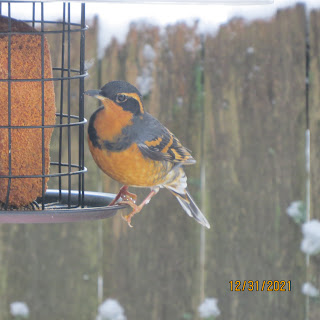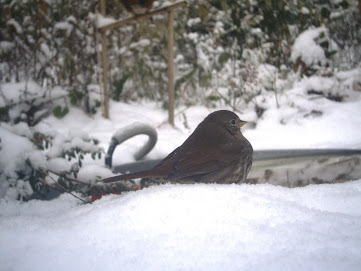For the Birds: Cold Is Here - Will You Help Our Birds?
Tuesday, March 7, 2023
 |
| Black-capped Chickadee keeping warm by creating an insulating air barrier. Photo by Craig Kerns |
Cold and snow are hard on birds, especially since much of their native dense habitats have been destroyed by development, making it hard for them to find shelter, food, and water.
Trees, especially tall evergreens, give them places to hunker down during cold and windy weather.
Trees are usually the first to feel the cut of progress, followed by diversion of water.
Over three billion birds have vanished in North America, mostly due to habitat loss.
Over three billion birds have vanished in North America, mostly due to habitat loss.
Habitat can mean the difference between life and death.
If you see a bird all fluffed up, it is trying to stay warm by creating warm air pockets around its body with its feathers.
We need to help birds (and other pollinators and wildlife) by providing food, shelter, and usable water, especially during cold weather.
If you see a bird all fluffed up, it is trying to stay warm by creating warm air pockets around its body with its feathers.
We need to help birds (and other pollinators and wildlife) by providing food, shelter, and usable water, especially during cold weather.
 |
| Varied Thrush getting fast energy from suet. Photo by Christine Southwick |
Suet and good quality seeds can provide that margin between survival and death.
Feeders offer quick, certain sources of calories, allowing birds to conserve their calories for warmth, not expending energy searching for their next meal.
Watch your feeders for clumping of seeds during damp weather.
If seeds clump, throw the seed out and wash the feeders with 10% bleach, rinse well, and dry before filling (a second feeder would be helpful); during times of fog and heavy moisture only filling feeders half full will help keep the seeds from molding.
Yes, it’s more work, but the birds are worth it.
 |
| Spotted Towhee and Song Sparrow eating seed below feeder. Photo by Christine Southwick |
Anna’s Hummingbirds eat more bugs than any other North American hummingbird, but freezing temperatures kill the bugs, so nectar is very important.
They need lots of quick energy early in the morning, and late into the evening.
A feeder heater or an incandescent light near a feeder will allow them to come whenever they want to, especially for a much-needed early visit.
 |
| Fox Sparrow using much needed liquid water maintained by bird bath heater. Photo by Christine Southwick |
For liquid water, invest in a birdbath warmer.
Give our birds a fighting chance.
Create shelter, with evergreen shrubs and trees, and safe places for them to nestle down (Don’t poison their habitat with pesticides).
Provide liquid water and food especially during the winter, and they will reward you with bubbly songs and bug elimination the rest of the year.




0 comments:
Post a Comment